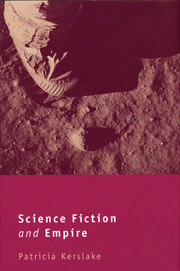Book contents
- Frontmatter
- Contents
- Introduction
- 1 The Self and Representations of the Other in Science Fiction
- 2 Resistance Is Futile: Silencing and Cultural Appropriation
- 3 The Word for World Is Forest: Metaphor and Empire in Science Fiction
- 4 Things Fall Apart: Relativity, Distance and the Periphery
- 5 Moments of Empire: Perceptions of Lasswitz and Wells
- 6 Exoticising the Future: American Greats
- 7 The Shape of Things to Come: Homo futuris and the Imperial Project
- 8 A Postcolonial Imagination: Kim Stanley Robinson's Mars
- 9 Beyond Empire: Meta-empire and Postcoloniality
- Conclusion
- Notes
- Bibliography
- Index
3 - The Word for World Is Forest: Metaphor and Empire in Science Fiction
- Frontmatter
- Contents
- Introduction
- 1 The Self and Representations of the Other in Science Fiction
- 2 Resistance Is Futile: Silencing and Cultural Appropriation
- 3 The Word for World Is Forest: Metaphor and Empire in Science Fiction
- 4 Things Fall Apart: Relativity, Distance and the Periphery
- 5 Moments of Empire: Perceptions of Lasswitz and Wells
- 6 Exoticising the Future: American Greats
- 7 The Shape of Things to Come: Homo futuris and the Imperial Project
- 8 A Postcolonial Imagination: Kim Stanley Robinson's Mars
- 9 Beyond Empire: Meta-empire and Postcoloniality
- Conclusion
- Notes
- Bibliography
- Index
Summary
Metaphors identify phenomena in a manner that is literally distinct from their realities. This allows a game of chess to become a ‘battle of wits’, enables the poet U. A. Fanthorpe to ‘choke the future back down our throats’ and justified Arthur C. Clarke's modelling of his alien ‘Overlords’ as the ‘shepherds’ of humankind in Childhood's End (1953). Metaphor creates a higher level of understanding by using elements of an older, already existent knowledge and placing it into an unfamiliar space, as with the typical Asimov observation that ‘Astronomers were queer ducks’. Both metaphor and metonymy are eloquent in SF, as authors experiment with the human mindset on planets populated with alien life forms and fantastic, unknowable cultures. As George Lakoff and Mark Turner suggest:
Complex metaphors grip us partly because they awake in us the experience and knowledge that form the grounding of those metaphors, partly because they make the coherence of that experience and knowledge resonate, and partly because they lead us to form new coherences in what we know and experience.
Given that metaphor is traditionally the product of imagination, it is interesting to note as an aside that even in the realm of science, usually the most quantifiable and concrete of disciplines, there is a place for such creative description: a ‘black hole’, for example, is neither black nor a hole – the term was chosen to communicate the fact that light and matter inevitably fall and are lost into these seemingly endless voids.
- Type
- Chapter
- Information
- Science Fiction and Empire , pp. 43 - 62Publisher: Liverpool University PressPrint publication year: 2010

